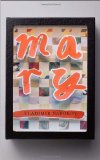Book Review: “Mary” by Vladimir Nabokov
December 21, 2009
Utterly magnificent without qualification. As a Nabokov admirer, I am yet a dilettante. I’ve of course read Lolita. Pale Fire is one of my favorite books but to claim I comprehend its complexities would be absurd. And Ada confounded me entirely.
To better understand Nabokov I decided it might make sense to read him from the beginning. I already owned a copy of Mary–his first novel, written in Russian–and pulled the copy off of its bookcase last night with aims to scan the first few pages (to see what I was in for).
60 pages later it was only with great effort and a bit of maturity (it was nearly one o’clock in the morning) that I managed to pause for sleep, gulping down the second half of the novella this morning.
Broadly, the story is about visceral first love, loss and recollection. About the conflation of memory and fantasy. More deeply I’d be at a loss to plumb the depths of this work’s meanings without years of careful study. I know it’s the most autobiographical of Nabokov’s fictional works. I know it unlocks many of the themes and symbols Nabokov would continue to use throughout his literary career.
But beyond that I can only rely on a quick dead reckoning and my own emotional response to try to grapple an understanding.
I finished the last page mere minutes ago, but already I am deeply ruminant about Nabokov’s use of color symbolism in Mary. Violet and yellow make the most frequent appearances, but blue, black, green, white and the rest of the spectrum get their turns, too.
In tone, the book is sparkling. Nabokov’s close supervision of the translation is obvious: the English is so handsomely turned out that it is difficult to find a superlative to describe it. Each word seems as carefully chosen as each (meaningful and disclosing) character’s room and personal items in the boarding house they all share in a Russian district of Berlin. Nothing is wasted.
It’s the mid-1920s and protagonist Ganin indolently kills time, a lackluster soul, purposeless since his escape from revolutionary Russia some years prior. The other boarders in Frau Dorn’s pension run the gamut from tragic to ridiculous. It is the end of winter.
“…nostalgia in reverse, the longing for yet another strange land, grew especially strong in spring,” thinks Ganin early in the story. Stifled and stagnated, ready for something of meaning, he is primed for a crisis when he discovers that his fellow boarder’s wife–slated to arrive the following Saturday, ending a long separation–is none other than his former, long-lost first love.
The story is tight and rapid, with a tensional acceleration that left me breathless for the resolution. Dialog and interactions in the boarding house feel Chekhovian; the concrete occurrences feel like scenes in a play, while Ganin’s recollections take on a poetic dreaminess.
Every page felt like a gift, and every sentence like a gift, up until the very last word.
Get the Book!
Buy the books mentioned in this post from Amazon.com now and help me maintain my rock 'n roll lifestyle.
Related Posts
- Book Review: “King, Queen, Knave” by Vladimir Nabokov
January 25, 2010 - Book Review: “The Eye” by Vladimir Nabokov
November 25, 2010 - Book Review: “The Defense” by Vladimir Nabokov
November 22, 2010 - Reading: Thomas Mullen’s New Book; “First” of 2010
January 22, 2010 - Book Review: “Ficciones” by Jorge Luis Borges
March 5, 2010

